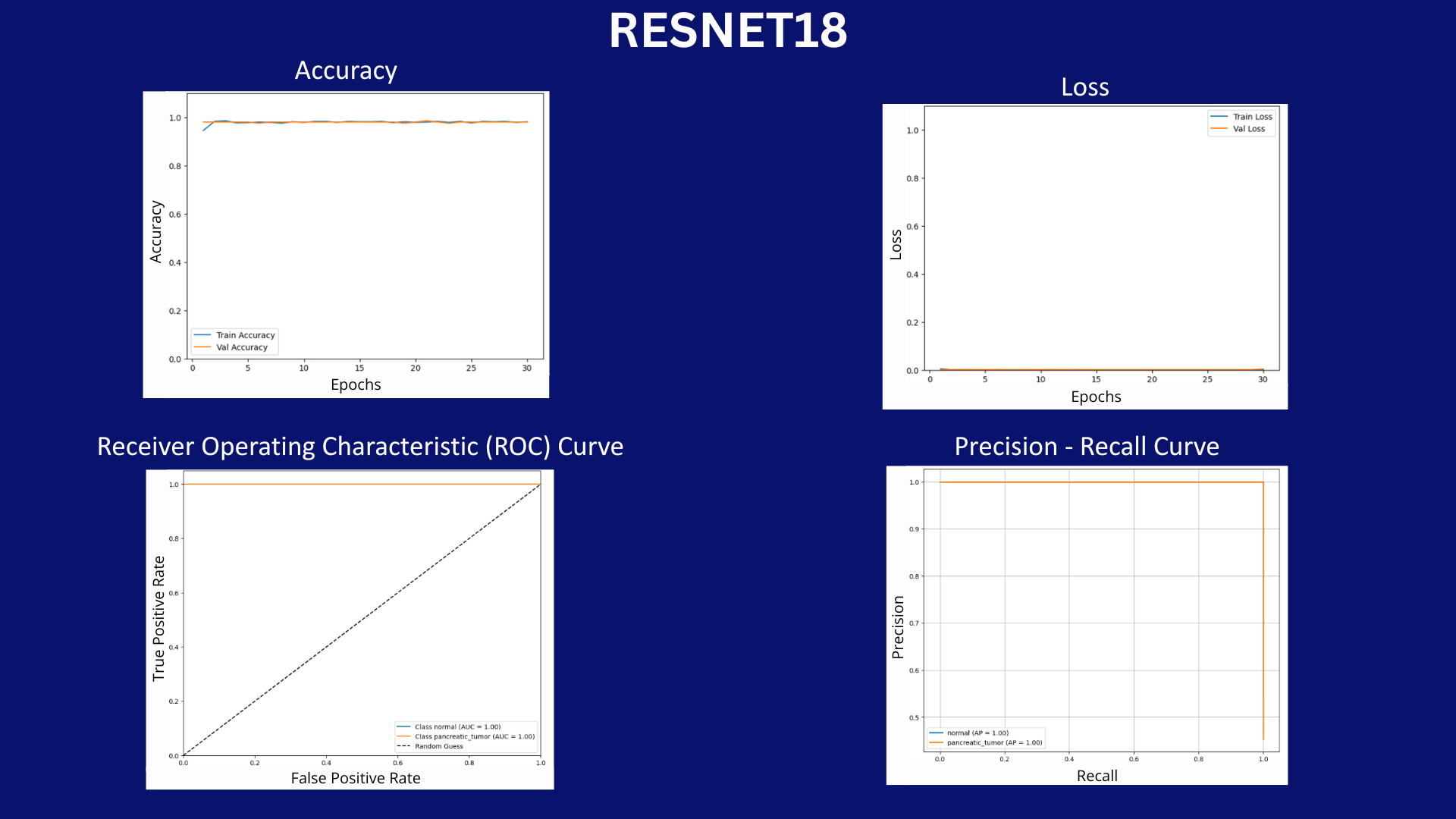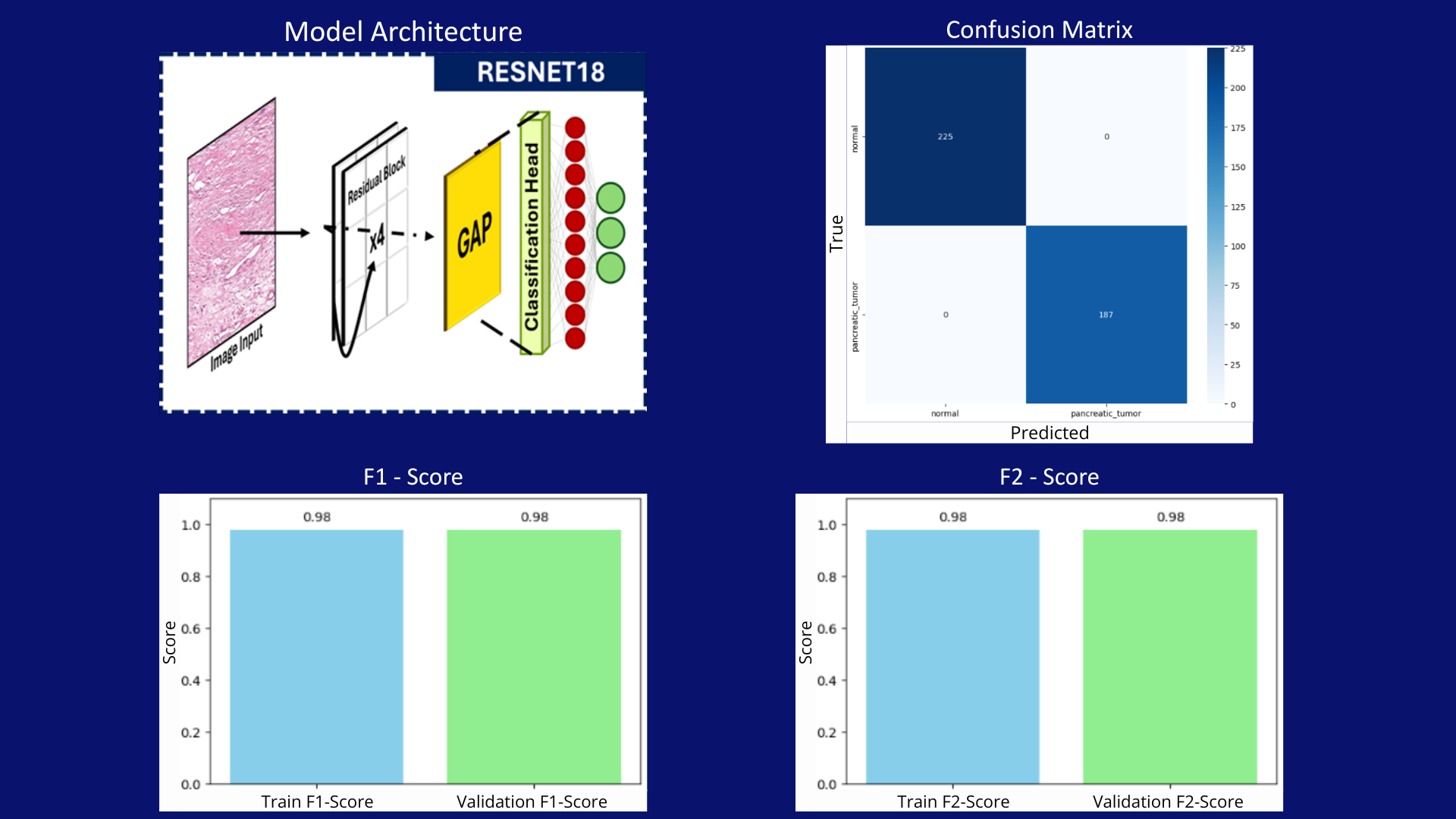Sunday Poster Session
Category: Biliary/Pancreas
P0095 - A Pioneering Neural Network Model, ResNet18-Powered Universal Application for Pancreatic Cancer Diagnostics
Sunday, October 26, 2025
3:30 PM - 7:00 PM PDT
Location: Exhibit Hall
- EK
Elangovan Krishnan, MBBS, PhD, MS
AIM DOCTOR
Chennai, Tamil Nadu, India
Presenting Author(s)
Elangovan Krishnan, MBBS, PhD, MS1, Suchith Boodegere Suresh, 2, Ramya Elangovan, 3, Khutaija Noor, MBBS, FCR4, Kavin Elangovan, 3, Jansi Sethuraj, BSN, RN, CCRN5
1AIM DOCTOR, Chennai, Tamil Nadu, India; 2Montefiore St Luke's Cornwall Hospital, Newburgh, NY; 3AIM DOCTOR, Houston, TX; 4Amicis Clinical Trials, Hyderabad, Telangana, India; 5University of Texas Health Science Center, Houston, TX
Introduction: Pancreatic cancer remains one of the most lethal malignancies, largely due to its late presentation and the inherent limitations of conventional imaging for early detection. Artificial intelligence, particularly deep learning, is rapidly transforming oncologic diagnostics by enabling the extraction of subtle, high-dimensional features from complex medical images. ResNet18, a pioneering residual neural network, utilizes skip connections to facilitate deeper model training and robust feature representation, making it exceptionally suited for challenging tasks such as pancreatic cancer detection on CT imaging.
Methods: Anonymized CT images of both malignant and normal pancreas (n=2060) were systematically divided into training (60%), validation (20%), and testing (20%) sets. Rigorous preprocessing and data augmentation were applied to enhance model generalizability. The ResNet18 architecture was trained and optimized, with diagnostic performance assessed using accuracy, precision, recall, F1-score, F2-score, and area under the receiver operating characteristic curve (AUC) on validation and test sets. The final model was deployed in a universally accessible, multiplatform application for global expert validation and real-time diagnostic support.
Results: ResNet18 demonstrated remarkable diagnostic performance in differentiating pancreatic tumors from normal tissue. The model achieved perfect classification in both classes, with a confusion matrix showing 225/225 normal and 187/187 tumor cases correctly identified. Both training and validation F1-scores and F2-scores were 0.98. The accuracy curve remained consistently above 98%, and the loss curve approached zero. The ROC curve and precision-recall curves both yielded an AUC of 1.00 for each class, underscoring the model’s extraordinary discriminative ability.
Discussion: These findings highlight the transformative promise of ResNet18 in early pancreatic cancer detection. By leveraging residual learning, ResNet18 captures nuanced imaging features often imperceptible to human observers, thus transcending the limitations of traditional radiology. Universal deployment through a cross-platform application democratizes access to advanced diagnostics, empowering clinicians with robust, real-time decision support and potentially improving outcomes in this devastating malignancy.

Figure: ResNet18 (Diagnostic Performance)

Figure: ResNet18 (Model Architecture and Diagnostic Performance)
Disclosures:
Elangovan Krishnan indicated no relevant financial relationships.
Suchith Boodegere Suresh indicated no relevant financial relationships.
Ramya Elangovan indicated no relevant financial relationships.
Khutaija Noor indicated no relevant financial relationships.
Kavin Elangovan indicated no relevant financial relationships.
Jansi Sethuraj indicated no relevant financial relationships.
Elangovan Krishnan, MBBS, PhD, MS1, Suchith Boodegere Suresh, 2, Ramya Elangovan, 3, Khutaija Noor, MBBS, FCR4, Kavin Elangovan, 3, Jansi Sethuraj, BSN, RN, CCRN5. P0095 - A Pioneering Neural Network Model, ResNet18-Powered Universal Application for Pancreatic Cancer Diagnostics, ACG 2025 Annual Scientific Meeting Abstracts. Phoenix, AZ: American College of Gastroenterology.
1AIM DOCTOR, Chennai, Tamil Nadu, India; 2Montefiore St Luke's Cornwall Hospital, Newburgh, NY; 3AIM DOCTOR, Houston, TX; 4Amicis Clinical Trials, Hyderabad, Telangana, India; 5University of Texas Health Science Center, Houston, TX
Introduction: Pancreatic cancer remains one of the most lethal malignancies, largely due to its late presentation and the inherent limitations of conventional imaging for early detection. Artificial intelligence, particularly deep learning, is rapidly transforming oncologic diagnostics by enabling the extraction of subtle, high-dimensional features from complex medical images. ResNet18, a pioneering residual neural network, utilizes skip connections to facilitate deeper model training and robust feature representation, making it exceptionally suited for challenging tasks such as pancreatic cancer detection on CT imaging.
Methods: Anonymized CT images of both malignant and normal pancreas (n=2060) were systematically divided into training (60%), validation (20%), and testing (20%) sets. Rigorous preprocessing and data augmentation were applied to enhance model generalizability. The ResNet18 architecture was trained and optimized, with diagnostic performance assessed using accuracy, precision, recall, F1-score, F2-score, and area under the receiver operating characteristic curve (AUC) on validation and test sets. The final model was deployed in a universally accessible, multiplatform application for global expert validation and real-time diagnostic support.
Results: ResNet18 demonstrated remarkable diagnostic performance in differentiating pancreatic tumors from normal tissue. The model achieved perfect classification in both classes, with a confusion matrix showing 225/225 normal and 187/187 tumor cases correctly identified. Both training and validation F1-scores and F2-scores were 0.98. The accuracy curve remained consistently above 98%, and the loss curve approached zero. The ROC curve and precision-recall curves both yielded an AUC of 1.00 for each class, underscoring the model’s extraordinary discriminative ability.
Discussion: These findings highlight the transformative promise of ResNet18 in early pancreatic cancer detection. By leveraging residual learning, ResNet18 captures nuanced imaging features often imperceptible to human observers, thus transcending the limitations of traditional radiology. Universal deployment through a cross-platform application democratizes access to advanced diagnostics, empowering clinicians with robust, real-time decision support and potentially improving outcomes in this devastating malignancy.

Figure: ResNet18 (Diagnostic Performance)

Figure: ResNet18 (Model Architecture and Diagnostic Performance)
Disclosures:
Elangovan Krishnan indicated no relevant financial relationships.
Suchith Boodegere Suresh indicated no relevant financial relationships.
Ramya Elangovan indicated no relevant financial relationships.
Khutaija Noor indicated no relevant financial relationships.
Kavin Elangovan indicated no relevant financial relationships.
Jansi Sethuraj indicated no relevant financial relationships.
Elangovan Krishnan, MBBS, PhD, MS1, Suchith Boodegere Suresh, 2, Ramya Elangovan, 3, Khutaija Noor, MBBS, FCR4, Kavin Elangovan, 3, Jansi Sethuraj, BSN, RN, CCRN5. P0095 - A Pioneering Neural Network Model, ResNet18-Powered Universal Application for Pancreatic Cancer Diagnostics, ACG 2025 Annual Scientific Meeting Abstracts. Phoenix, AZ: American College of Gastroenterology.
